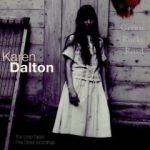|
|
 |
Dusted Reviews
Artist: Karen Dalton Album: Green Rocky Road Label: Delmore Review date: Jul. 17, 2008 |

|
|
|
 |
Recorded "on two tracks" (as Dalton plainly states) in 1962 and 1963, the material for Green Rocky Road came from the same trove of reel-to-reel tapes that gave birth to Cotton Eyed Joe last year. The main difference is that Cotton Eyed Joe was played for an audience in a tiny Colorado coffee house, while Green Rocky Road was laid down at home and mostly alone. So, while Cotton Eyed Joe was interspersed with the evidence of other people – applause, conversation, a certain communicativeness in the playing – this one seems almost wholly internal.
Dalton is still in her mid-20s here, not yet smoothed or styled by contact with Bleecker Street contemporaries like Fred Neil, not yet plagued by the addictions of her later years. She has not yet learned the sophisticated jazz-like phrasing of So Hard to Tell Who's Going to Love You Best, and her approach is plain-spoken, strong and solitary. You have only to contrast Green Rocky Road's "Ribbon Bow" with the one she recorded for Capitol half a decade later to hear the difference. Here, "Ribbon Bow" is all her, the extraordinarily emotive voice, the steady thrum of 12-string. You feel, almost, as if you're eavesdropping, so private and meditative is the song. By the time she comes back to "Ribbon Bow" in 1969, her voice has modulated, landing lightly on the notes, curving around them in blues-tinged flourishes. She no longer sounds like she is thinking aloud, but rather performing. It is as if, in the interim, she has gone from dreaming about "if I were like city girls" to becoming one.
You can't imagine the later, more sophisticated Karen Dalton plunking out the cowboy song "Whoopee Ti Yi Yo" on her banjo, as she does here with obvious gusto. Nor can you picture a conversation like the one that opens "In the Evening" when Dalton asks some unnamed if they were allowed to dance in any part of Bleecker Street (many religious folks were not). These songs are rougher, harsher and more countrified than the work that made Dalton a favorite of the new folk generation, a reminder that however relevant she is now, she is very much a part of an earlier generation.
Yet, Dalton is also something of a lone figure, historically, one of a few women to play as equals alongside Neil and Ramblin' Jack and Peter Walker; a misfit, an outsider, and an unmarried mother at a time when those things mattered. And that, really, is what Green Rocky Road conveys – the utter solitariness of a woman left to her music, sad and strong and more than a little lonely. The title track, sung in a sure, confident voice over a thicket of guitar and banjo, could be a field recording from a forgotten Appalachian village. It has none of the polish, but all of the infinite longing of Dalton's later work.
You have to wonder what Dalton would have thought, if she were alive, about the release of these unfiltered songs, whether she would be embarrassed about them or proud. They're sketches really, with strong lines and hardly any shading, a rough indication of what she would become.
By Jennifer Kelly
|







